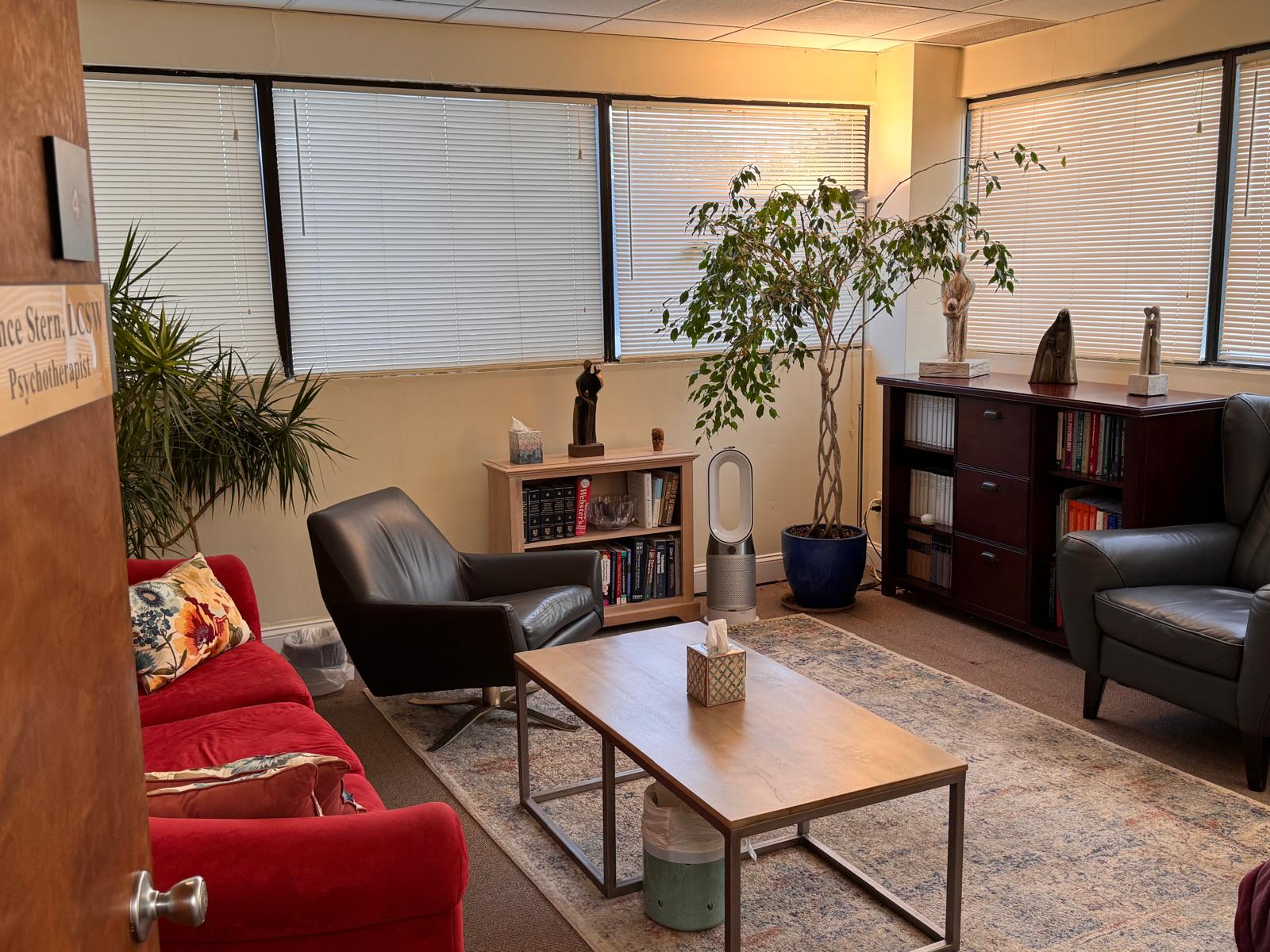Teen Therapy
Teen Therapy
Lance Stern, LCSW, BCD
Licensed in New Jersey & New York
Lance Stern, LCSW, BCD
Licensed in New Jersey & New York
Being a young adult comes with pressures from every direction – school, friends, family, and the push toward independence. These years can feel overwhelming, and emotions often come faster than they can be understood.
My role is to create a safe space where you or your teen can slow down, reflect, and begin to make sense of themself and the world around them.
I typically work with teens 16 years and older, younger teens will be accepted on a case by case basis.

Hello, I’m Lance
I’m a Board Certified Psychotherapist, licensed in both New Jersey and New York. For many years, I’ve worked with teens and young adults who often feel misunderstood by parents, teachers, or even themselves. My psychoanalytic approach isn’t about giving advice or fixing behaviors, it’s about helping teens reflect on their thoughts, feelings, and reactions so they can better make sense of and connect with the world around them.
Whether your teen is struggling with anxiety, anger, depression, trouble at school, or simply needs a guide in making sense of a confusing time, I am here to help them develop a deeper understanding of themself and the world around them.
I offer both in-person sessions at my Upper Saddle River office and virtual therapy through a secure, HIPAA compliant video platform for clients throughout New Jersey and New York. Together, we’ll create a warm, judgment-free environment where you can speak openly about your thoughts and experiences and begin working toward the life you envision.
About My Approach to Teen Therapy
My approach with teens and young adults is to help them make sense of feelings and behaviors that often feel confusing, overwhelming, or misunderstood. The challenges that show up in school, friendships, or at home are rarely random – they are shaped by both inner conflicts and the push-and-pull of growing independence.
In therapy, I create a space where teens can reflect openly and begin to recognize how their experiences, emotions, and reactions fit together, building a stronger sense of who they are and how they relate to others.
The Psychanalytic Difference
Many therapeutic approaches for teens focus on tools to manage behaviors, school stress, or emotional ups and downs. While those can be useful, my approach aims to understand the drivers behind behaviors and what your teen may be feeling that’s causing them even more turmoil.
In our work, we may explore:
- How early family relationships shape current emotions and choices
- The unconscious triggers behind anxiety, depression, or anger
- The tension between independence and connection with parents
- Patterns in friendships, dating, or school that repeat and cause frustration
By focusing on curiosity and self-understanding, teens begin to develop insight that strengthens their sense of identity and resilience — not just in the moment, but in the years ahead.
Specialized Support for All Types of Challenges
While my psychoanalytic approach can help with a wide range of concerns, there are several areas where clients frequently seek my support. Rather than simply managing symptoms, we’ll work to understand the deeper patterns and experiences that contribute to these challenges.
Addiction
Addiction often develops as a way of coping with pain, stress, or unresolved inner conflicts. Rather than focusing only on short-term fixes to stop the behavior, we’ll look at the deeper patterns and experiences that drive it. By understanding the unconscious forces driving your actions, you can begin to work on the core struggles instead of the symptom.
Anger
Anger is often more than a quick reaction. It can signal deeper feelings of hurt, fear, or frustration that haven’t yet been acknowledged. In our work together, we’ll explore the why behind your anger, looking at the underlying patterns, past experiences, and inner conflicts that fuel it. By understanding its roots, you can begin to respond with greater clarity and create healthier ways of expressing yourself.
Bipolar Disorder
Living with bipolar disorder means navigating emotional highs and lows that can feel confusing and overwhelming. Psychoanalytic therapy offers a space to better understand how these shifts affect your life and relationships, cultivating curiosity and compassion toward yourself as you work through these challenges.
Depression
Depression often signals important unacknowledged feelings or unmet needs. Together, we’ll explore what your depression might be communicating about your internal world, helping you develop a more compassionate relationship with yourself and reconnect with sources of meaning.
OCD
My approach to OCD combines understanding the function of obsessions and compulsions with exploring their deeper psychological meaning. We’ll work to address the underlying anxiety and uncertainty that drive obsessive-compulsive patterns.
Relationship Patterns
Many clients notice they repeatedly encounter similar challenges in relationships. Together, we’ll identify these patterns, understand their origins, and create opportunities for new, more fulfilling ways of connecting with others.
ADHD/ADD
For adults and teens with ADHD, we look beyond symptom management to understand how ADHD impacts your sense of self, relationships, and life experiences. We’ll explore both practical strategies and the emotional dimensions of living with ADHD.
Anxiety
Beyond teaching coping mechanisms, we’ll explore the underlying sources of your anxiety. We will find out if they stem from early experiences, relationship patterns, unacknowledged conflicts, or something else. This deeper understanding often leads to more lasting relief than symptom management alone.
Borderline Personality Disorder
Borderline personality disorder can bring intense emotions, difficulty maintaining relationships, and fears of abandonment that feel painful and consuming. With psychoanalysis, we focus on building a deeper understanding of yourself, your experiences with relationships, and what unconscious thought patterns could be driving your actions and feelings. I aim to help you become curious about yourself and uncover your hidden beliefs through this introspection.
Dissociative Identity Disorder
With dissociative identity disorder, maintaining meaningful relationships with both yourself and others can feel out of reach. With psychoanalysis, we will explore your inner world and the different parts of yourself with patience and care. My goal is to be your guide to understanding yourself better and developing curiosity around your thoughts.
Psychosis
Experiencing psychosis can be confusing and isolating, especially when thoughts or perceptions are uncomfortable or frightening. The goal of our psychoanalytic work is to talk about your early experiences and how they shape your current reality, what hidden triggers may be driving your actions, and uncover how you feel connected to yourself.
All Other Human Conditions
Whether you have a diagnosis that is not on this list or just a different challenge you are facing in life, I am here for you.
My specialty is not confined to a certain psychological diagnosis because psychoanalytic therapy can be helpful to any and everyone, no matter what you are dealing with.
In my therapy sessions, I aim to put aside the labels and simply look at how your past and current experiences are affecting you, the way you feel, and the way you live your life.
A note to the LGBTQ+ community and other self-identified communities such as neurodivergent:
First I would like to say that I work with all people regardless of marital status, sexual orientation, gender identity or neurodivergence. But more importantly, I think it is imperative for all potential patients to understand that I approach everyone as an individual who has their own unique life experiences that shape and inform who they are today, without judgment.
I also understand and respect that some individuals who identify as belonging to certain communities would prefer to find and work with a therapist who also identifies with their community. While I do not share which, if any, community I might identify with, I welcome all members of my broader community; the human race.
I look forward to having an opportunity to speak with you and to discuss what you might be seeking.
In-Person & Virtual Therapy Options


My Practice in Upper Saddle River, New Jersey
For those who prefer the in-person connection, my office provides a quiet, comfortable space for our work together. I’ve intentionally created an environment that feels both professional and welcoming, a place where you can feel at ease as we explore challenging topics.
The office offers:
- Complete privacy and confidentiality
- Comfortable seating arranged for conversation
- A calm, distraction-free atmosphere
- Easy access from surrounding Bergen County communities
- An abundance of convenient parking
My hope is for this space to become a consistent anchor in your therapeutic journey, a dedicated environment for self-exploration and growth.
My office is located at 345 Rte 17 S, Upper Saddle River, New Jersey and I welcome people from any location throughout New Jersey, and even New York. If you want to make the drive, I would love to have you in my office.
Virtual Therapy Throughout New Jersey & New York
Distance and busy schedules shouldn’t stand between you and quality therapy.
As a licensed therapist in New Jersey and New York, I offer secure, confidential virtual therapy sessions through a HIPAA compliant platform for clients throughout these states to bring the same depth and quality of care directly to you, wherever you are.
Convenient & Efficient
Virtual therapy eliminates commute time and offers flexible scheduling options, making it easier to prioritize your mental health amid a busy lifestyle.
Comfortable Environment
Many clients find they open up more easily from the comfort of their own space. Virtual therapy allows you to engage in deep therapeutic work from an environment where you already feel secure and at ease.
Consistent Support
Weather, illness, or travel plans no longer mean missed sessions. Virtual therapy ensures continuity in your therapeutic journey, even when life circumstances change or unexpected situations arise.
Convenient & Efficient
Virtual therapy eliminates commute time and offers flexible scheduling options, making it easier to prioritize your mental health amid a busy lifestyle.
Comfortable Environment
Many clients find they open up more easily from the comfort of their own space. Virtual therapy allows you to engage in deep therapeutic work from an environment where you already feel secure and at ease.
Consistent Support
Weather, illness, or travel plans no longer mean missed sessions. Virtual therapy ensures continuity in your therapeutic journey, even when life circumstances change or unexpected situations arise.
Convenient & Efficient
Virtual therapy eliminates commute time and offers flexible scheduling options, making it easier to prioritize your mental health amid a busy lifestyle.
Comfortable Environment
Many clients find they open up more easily from the comfort of their own space. Virtual therapy allows you to engage in deep therapeutic work from an environment where you already feel secure and at ease.
Consistent Support
Weather, illness, or travel plans no longer mean missed sessions. Virtual therapy ensures continuity in your therapeutic journey, even when life circumstances change or unexpected situations arise.
How We’ll Work Together
Initial Contact
Fill out the contact form with some basic information. I’ll reach out as soon as possible to schedule a brief phone consultation.
This gives us a chance to discuss your needs and determine if my approach is a good fit for you.
You are also welcome to give me a call or email to set up our initial meeting.
First Session
Our first session allows us to dive deeper into what brings you to therapy and what you hope to gain from our work together.
I’ll ask questions about your current situation, relevant history, and goals. This is also your opportunity to ask any questions about my approach.
Ongoing Therapy
Most clients find weekly, and even bi-weekly, sessions to be the most effective, especially in the beginning.
This consistent schedule helps build momentum in our work and allow us to dive deep into why patterns are appearing in your life.
As we progress, we’ll continually assess and adjust our focus based on your evolving needs and insights.
I offer once or twice per week sessions to ensure we can keep the momentum going with what we are working on.
Since my practice focuses on diving deep into underlying patterns, it is important that we can quickly address what has been happening in your life and start uncovering how it is affecting you and why these patterns are appearing.
How We’ll Work Together
Initial Contact
Fill out the contact form with some basic information. I’ll reach out as soon as possible to schedule a brief phone consultation.
This gives us a chance to discuss your needs and determine if my approach is a good fit for you.
You are also welcome to give me a call or email to set up our initial meeting.
First Session
Our first session allows us to dive deeper into what brings you to therapy and what you hope to gain from our work together.
I’ll ask questions about your current situation, relevant history, and goals. This is also your opportunity to ask any questions about my approach.
Ongoing Therapy
Most clients find weekly, and even bi-weekly, sessions to be the most effective, especially in the beginning.
This consistent schedule helps build momentum in our work and allow us to dive deep into why patterns are appearing in your life.
As we progress, we’ll continually assess and adjust our focus based on your evolving needs and insights.
I offer once or twice per week sessions to ensure we can keep the momentum going with what we are working on.
Since my practice focuses on diving deep into underlying patterns, it is important that we can quickly address what has been happening in your life and start uncovering how it is affecting you and why these patterns are appearing.
